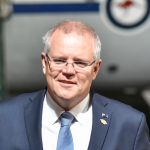Getting the right balance in fighting COVID-19

Mark Beeson’s recent piece on the Covid-19 pandemic, ‘The revenge of Gaia?’, was a bewildering read.
Beeson suggested that Covid-19 is, like climate change, ‘a product of changes in the natural environment’ and ‘partly a consequence of human activity and our collective impact on the biosphere’.
Of course, the pandemic we’re facing is partly a consequence of human activity, but it would be more appropriate to identify the role played by unregulated ‘wet markets’ where anything and everything is up for consumption. There was once a time when cross-species outbreaks of this kind would principally kill local residents before petering out, but in our globalised world they pose a threat to us all.
The common thread linking the novel coronavirus and climate change is actually one that Beeson neglects to address. As we’ve seen, the response to Covid-19, which Beeson considers doesn’t go far enough, is already having dramatic economic consequences.
Virtually overnight, many thousands of Australians have found themselves out of work, including many who had been in full-time employment for their entire adult lives.
The health crisis is closely associated with an economic crisis, and that’s the connection that should be drawn with climate change. It will always possible to ‘do more’ to combat climate change, but the economic consequences for many working Australians would be catastrophic.
As with the response to Covid-19, a responsible government needs to balance the various factors involved. The government could lock down the entire country overnight to minimise the further spread of Covid-19, but at the cost of even more extensive damage to the economy.
Similarly, Australia could pursue more radical measures to reduce CO2 emissions, but that would come with considerable economic costs, with enormous implications for working Australians.
The Australian government is responding very well to the enormous challenge of Covid-19, better than most others. In a perfect world, Australia should be prepared for everything and instantly able to implement policies that solve problems that arise. In the real world, though, unexpected developments can knock even the best prepared off balance, and trade-offs need to be made between different priorities.
This is the approach underpinning the government’s response to both Covid-19 and climate change. It aims to strike a balance between managing risks and mitigating the costs of those actions in order to maintain a strong economy and protect the livelihoods of working Australians.
Covid-19 demonstrates that taking extreme measures on climate change or on anything else, including pandemics, will have severe consequences. Australians are seeing this in the economy’s response to the health crisis, in the failed businesses and the impact on those who are most vulnerable to an economic downturn. One is left to wonder what might happen if extreme climate change measures were implemented without regard to the economic consequences.
Australians now know the consequences of unbalanced reactions to developments that are effectively outside our control. They are more likely to support taking a balanced and measured approach to climate change because they now further recognise the consequences of unbalanced actions.
Beeson concedes that China’s government is ‘unaccountable and authoritarian’, but he says it has demonstrated what determined leadership can do. He considers that as a result of the crisis, ‘America’s political and economic system may be thrown into sharp and unflattering comparative relief with China’s.’
That’s a bold claim, considering the evidence that the regime’s attempt to cover up the outbreak in its early stages was a major contributor to its spiralling out of control—not to mention more recent signs that the official statistics on China’s infection rates are being falsified to put things in the best possible light.
One can also consider the stories in the Nine media group that Chinese enterprises had been engaged to ransack Australian caches of medical supplies, including surgical masks, thermometers, antibacterial wipes, hand sanitisers, gloves and Panadol, before the pandemic reached Australian shores.
Now we see China pledging support to the Middle East and elsewhere, including donations of medical supplies, hoping to capitalise on the pandemic to win new diplomatic allies. One is left to wonder about the source of those supplies that are now being so generously donated.
Even when considering the deficiencies in the American response, I, like most Australians, would always favour a government that is committed to openness and transparency, that would not deliberately falsify figures, and that would not use a health crisis for self-serving geopolitical ends.
It goes to show that, notwithstanding rhetoric about building ‘a community of common health for mankind’, the competitive struggle between nations continues unabated. Maybe the ‘eye-wateringly expensive military hardware’ that Beeson derides continues to be necessary after all.
This article was published by The Strategist.
Jim Molan is an Australian politician and former major general in the Australian Army. He has been a Liberal Senator for New South Wales since December 2017.










